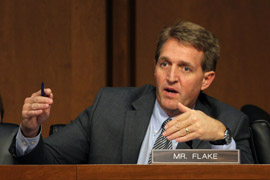Flake joins congressional delegation to Cuba, agenda under wraps

 By Michelle Peirano and Jessica Goldberg
By Michelle Peirano and Jessica Goldberg
Cronkite News
In 12 years in the House, Sen. Jeff Flake, R-Ariz., sponsored 24 bills and eight resolutions on Cuba and proposed eight Cuba-related amendments to other bills. They dealt with everything from decrying human-rights crackdowns on the island to loosening trade restrictions and included:
• 112th Congress (2011-2012): One bill, allowing travel for oil exploration; failed.
• 111th Congress (2009-2010): Four bills, dealing with travel, agricultural exports and energy; only one got out of committee.
• 110th Congress (2007-2008): Six bills, on travel, exports, humanitarian relief and family rights, among others; all failed.
• 109th Congress (2005-2006): Six bills, five resolutions and four amendments, on agricultural sales, travel and remittances, human rights and other topics; two resolutions passed.
• 108th Congress (2003-2004): Four bills, two resolutions and two amendments on trademarks, the embargo and human rights, among others; two resolutions passed.
• 107th Congress (2001-2002): Three bills, one resolution and two amendments; both amendments passed.
Source: The Library of Congress, www.thomas.loc.gov
WASHINGTON – Arizona Sen. Jeff Flake, long a proponent of less-restrictive relations with Cuba, is visiting the communist nation this week as part of a seven-member congressional delegation.
Few details were released on their agenda. But the State Department and delegation leader Sen. Patrick Leahy, D-Vt., said the group wanted to meet with jailed American Alan Gross, who was arrested more than three years ago for distributing communication technology to Cubans.
The State Department said Gross, who was working as a contractor for the Agency for International Development, was unjustly imprisoned and it hoped the delegation could make progress toward his release.
“We will look forward to the results of their diplomacy on his behalf and more broadly with regard to all of our concerns about Cuba human rights and other things,” State Department spokeswoman Victoria Nuland said in a press briefing Tuesday.
U.S.-Cuba policy watchers said talk of freer trade – which Flake has pushed in the past – will also likely be on the table.
Flake’s office did not return repeated requests for comment on the trip, and other congressional offices said they would not comment until the group returns later this week.
But it is not the first Cuba trip for Flake, who went four times as a House member and who introduced dozens of bills relating to Cuba during his 12 years in the House.
John Kavulich, former president and senior policy adviser of the U.S./Cuba Trade and Economic Council, said Flake has always been credible politically on Cuban relations because Arizona has little economic interest in Cuba. Flake is seen as “coming at the issue with clean hands,” Kavulich said.
Flake has advocated for fewer sanctions against Cuba since the beginning of his time in Congress, said Dennis DeConcini, a former Arizona senator who took Flake to Cuba in 2001 on a trip funded by the Alliance for Responsible Cuba Policy Foundation.
DeConcini said Flake – the only Republican on this week’s trip – intentionally skipped a meeting with Cuban President Fidel Castro on his first trip because he “thought it was against the policy under (President George W.) Bush at the time; he was kind of stepping out of bounds just to go there.”
During Bush’s term, sanctions against Cuba severely limited leisure travel, money transfers and shipments of U.S. goods and personal packages to the country. In 2009, President Barack Obama relaxed the restrictions to allow freer travel and a higher limit on money transfers and shipments of practical items.
For a short time after Obama loosened the restrictions, Flake was quieter about his opposition to sanctions, DeConcini said, but he has become more vocal now that he is in the Senate.
Despite hopes for the visit, Brian Alexander, a trustee of the Cuba Policy Foundation, said he does not think the delegation will get far with negotiations on trade or on Gross’s release.
“I don’t think they will get much traction with the Cuban government,” said Alexander, whose foundation works to expand trade with Cuba.
“The Cuban government has no interest in making the open accommodations that would allow the relationship to flourish,” he said.
Alexander said Gross’s detention is just a way for the Cuban government to undermine U.S. power and keep relations contentious.
“The Cuban government needs to make the decision that they want to play ball,” Alexander said.
Calls to the Cuban Interest Section in Washington were not returned Tuesday.
Besides Flake and Leahy, the delegation includes Sens. Debbie Stabenow of Michigan, Sheldon Whitehouse of Rhode Island and Sherrod Brown of Ohio, and Reps. Chris Van Hollen of Maryland and Jim McGovern of Massachusetts.
The delegation arrived in Cuba Monday and is scheduled to leave Wednesday for Haiti, before returning to the U.S.














